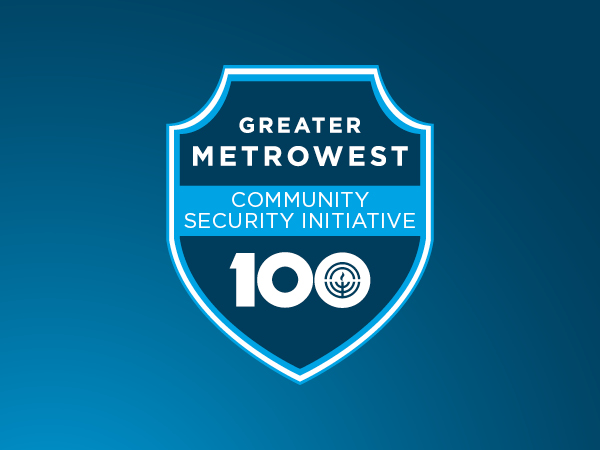
The events of October 7 and the subsequent social and political landscape have served as a stark reminder of the persistent threat posed by antisemitism and extremism.
With the ADL announcing a 400% increase in antisemitism in the U.S., the need for Jewish organizations to prioritize security and vigilance has never been more pressing. With this in mind, Federation’s Community Security Initiative (CSI) Team, in collaboration with Federation’s Community Security Council, the New Jersey Office of Homeland Security and Preparedness (NJOHSP), and private sector consultants presented a security update webinar to our Greater MetroWest synagogues and partner agencies last week.
Tom Hauk, Director of Intelligence and Operations at the New Jersey Office of Homeland Security and Preparedness (NJOHSP) spoke on the importance of the “If You See Something, Say Something” national campaign. The mission of this campaign is to help individuals recognize potential signs of an act of terrorism and to report such suspicious activities to law enforcement. He explained, “Our suspicious activity reporting is based on behavior. The importance of it is people in their own spaces, whether it is their house of worship, their school, their neighborhood, they know what the baseline is and what the norms are – so the public is really in many cases the first line of defense.”
Craig Sante and Christine Franchi, intelligence analysts at NJOHSP, provided a 2023 year-end review. They stressed that suspicious activities impacting the Jewish community have nearly doubled since 2022, but also attributed this to increased vigilance during the ongoing Israel-Hamas war. They then discussed current security threats in New Jersey. Elevated levels of threat for 2024 focuse on Homegrown Violent Extremism (HVE) and White Racially Motivated Extremists (WRME). HVEs are inspired by foreign terrorist organizations, rather than being directed by them. So, while a direct threat by Hamas in New Jersey is low, the concern is for HVEs who find inspiration from and commit violence in support of them. WRMEs, on the other hand, commit violence and criminal activity to further their ideology of the advancement of the white race.
Ehtasham Chaudhry, a detective NJOHSP spoke about the national “Stop the Bleed” Initiative, born out of the risk of extremists using houses of worship as soft targets due to the mass gatherings that take place and the ideologies they represent. This initiative encourages bystanders to become trained, equipped, and empowered to assist in a bleeding emergency and provides Bleeding Control Kits once individuals have received the training. He explained that in an active shooter event, most deaths occur from bleeding out, and the proper training and equipment can buy victims time until rescuers arrive. CSI’s Director of Training, Greg Drucks is a certified Stop the Bleed trainer and has already completed this training with multiple GMW Jewish institutions and will continue to do so.
Dorit Zimerman, Security Consultant and Grant Advisor in the CSI Team spoke about the upcoming Nonprofit Security Grant Program (NSGP) from the federal government that offers up to $150,000 for target hardening and security personnel for organizations like houses of worship and religious schools. She discussed the importance of having an up-to-date, detailed Vulnerability Risk Assessment (the written assessment used to identify and validate physical security deficiencies of an organization) and best practices in filling out the Investment Justification application form. The FY2024 NSGP will soon go live, so it is imperative that Greater MetroWest synagogues, Jewish schools, and agencies keep watch for information on the process for applying.
Mark Orciuoli, president and CEO of GitoTech, spoke about cybersecurity. In an era of digital interconnectedness, cyber threats pose a tangible risk, from data breaches to online harassment and disinformation. In order to accommodate congregants who are unable to attend services and events, live streaming has become part of many synagogues’ offerings. This has led to an increase in zoom bombing and unsolicited attention. Strengthening cybersecurity measures with robust firewalls, multi-factor authentication, and encryption protocols can not only guard against virtual security breaches, but also against the all-too-common phishing scams. Educating both employees and congregants and creating cybersecurity procedures for responding to a cyber breach are important steps in alleviating the damage by these threats.
If you have any questions or would like to hear more about the work done by the CSI team and the current security initiatives they support, contact Dorit Zimerman at dzimerman@jfedgmw.org.
